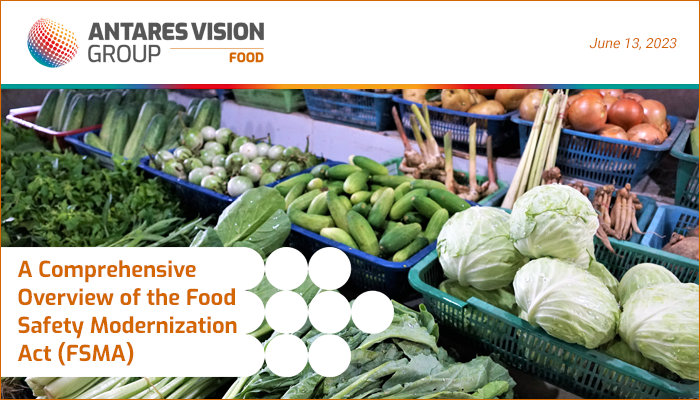Passed in 2011, the Food Safety Modernization Act (FSMA) authorized major changes to how the U.S. food supply chain operates. Growers, processors, and food manufacturers are all subject to new regulations intended to prevent foodborne illness and make the food supply safer, traceable, and more transparent. Learn more about FSMA, what it covers, and how it affects food safety compliance in this guide from rfxcel.
Food Regulations and Enforcement in the USA
Before the introduction of the Food Safety and Modernization Act, the Food and Drug Administration (FDA) provided industry guidance on how to reduce food safety hazards. While food businesses could become certified in Good Agricultural Practices (GAP) and Good Handling Practices (GHP), the guidelines offered by FDA were not enforceable.
FSMA expands FDA’s oversight, offering a clear regulatory framework and a set of preventive controls designed to take a proactive approach to food safety.
Importance of Food Safety
A safe and reliable U.S. food supply is critical, both for public health and national food security. According to the Centers for Disease Control and Prevention, foodborne illness affects one in six Americans each year and accounts for 3,000 deaths annually. Investing in food safety measures is important for many reasons. Robust federal support for food safety:
- Improves consumer confidence in America’s food supply
- Reduces the burden on the U.S. healthcare system by keeping people healthier
- Helps detect and contain foodborne illness outbreaks before they spread
What Is the Food Safety Modernization Act (FSMA)?
The Food Safety Modernization Act (FSMA), signed into law in January 2011, authorizes the U.S. Food and Drug Administration (FDA) to take a preventive approach to food safety problems. This new approach gives FDA the authority to establish food safety standards for stakeholders throughout the food and beverage industry supply chain. FSMA amends the Federal Food, Drug, and Cosmetic Act, first passed in 1938.
Why Did the Food and Drug Administration Pass FSMA?
Bacteria, parasites, and other foodborne pathogens make 48 million Americans sick each year. And the nature of today’s global economy means that the food Americans eat could be grown in one state or country, processed in another, then distributed nationwide. By the time an outbreak of E. coli, listeria, or another foodborne disease is identified, hundreds – or even thousands – of consumers could have purchased food that is potentially contaminated.
With FSMA’s new regulations, the goal is to stop these kinds of outbreaks before they happen. Without proper preventive controls, including mandated food traceability requirements, food businesses risk losing valuable time and money dealing with food recalls that can damage their public image.
CDC and FSMA
While FDA is the primary U.S. federal agency tasked with implementing FSMA regulations, the law also provides a directive to the Centers for Disease Control and Prevention (CDC). This agency is tasked with improving the collection, analysis, and reporting of data on foodborne illnesses and outbreaks. CDC must also create and manage Integrated Food Safety Centers of Excellence in partnership with state health departments.
These centers offer technical assistance and training for local health departments, improving their ability to track and trace foodborne disease outbreaks. CDC is also responsible for developing guidelines to manage food allergy and anaphylaxis risks in educational institutions.
When Did FSMA Take Effect?
FSMA was signed into law in January 2011. However, new food safety regulations did not go into effect right away upon passage. Through FSMA, Congress simply authorized FDA to establish food safety requirements for growers, processors, and packers. Implementation of various regulations is ongoing. That means that food businesses must navigate a shifting regulatory landscape as new rules are proposed, finalized, and implemented.
Food Safety Modernization Act Compliance
Under FSMA, FDA has the authority to create and enforce policies through the federal rulemaking process. To date, FDA has finalized nine major rules concerning food production, traceability, transportation, and more. The FSMA guidelines also give FDA new authority to inspect facilities that manufacture, process, or store food for consumption, both in the U.S. and abroad.
The Food Safety Modernization Act Regulations
FSMA’s regulations affect each step of the food chain from field to fork. Per the administrative rulemaking process, federal agencies must publish a proposed rule, then accept and review feedback during a public comment period. The agency may make changes to the final proposed rule based on these comments. Once an agency publishes a final rule in the Federal Register, it typically goes into effect thirty days or more after publication.
FDA’s proposed and final rules and related programs under FSMA include:
- Agricultural Water
- Accredited Third-Party Certification
- Food Traceability
- Foreign Supplier Verification Programs (FSVP)
- Laboratory Accreditation for Analyses of Foods (LAAF)
- Mitigation Strategies to Protect Food Against Intentional Adulteration
- Preventive Controls for Human Food
- Preventive Controls for Animal Food
- Produce Safety
- Sanitary Transportation of Human and Animal Food
- Voluntary Qualified Importer Program (VQIP)
FSMA Section 204 and the Three Pillars of Traceability
Section 204 of FSMA is entitled “Enhancing Tracking and Tracing of Food and Recordkeeping.” It has three traceability requirements and instructs the FDA to develop additional recordkeeping requirements for certain foods. Quoting verbatim from the Agency’s website, the FDA must:
- Establish pilot projects in coordination with the food industry to explore and evaluate methods and appropriate technologies for rapid and effective tracking and tracing of foods.
- Designate foods for which additional recordkeeping requirements are appropriate and necessary to protect the public health.
- Publish a notice of proposed rulemaking to establish such additional recordkeeping requirements for the designated foods, to help in tracing such foods.
The Food Safety Modernization Act Impact
The passage of FSMA fundamentally changed FDA’s approach to outbreaks of foodborne illness and risk management. Instead of focusing on responding to outbreaks that have already occurred, FSMA prioritizes taking steps to prevent foodborne illness and cross-contamination on farms and food facilities. The legislation means that food businesses are now subject to:
- FDA-mandated recalls
- Facility inspections
- Updated registration requirements
Additionally, FDA guidelines for food safety empower the agency to review facility records and suspend a food facility’s registration if its products are likely contaminated.
How FSMA Affects the Food Industry
FSMA implements new FDA standards for farmers who grow fruits and vegetables. The Produce Safety Rule applies to any grower with average annual produce sales of $25,000 or more. This rule establishes requirements for:
- Training for workers who harvest or handle produce
- Water quality testing
- Preventing contamination from on-farm animals and wildlife
- Sanitizing tools and equipment
- Recordkeeping
The Produce Safety Rule does not apply to certain fruits and vegetables that are rarely consumed raw, such as beans and potatoes. Furthermore, FSMA does not apply to meat and poultry products, which are regulated by the United States Department of Agriculture (USDA).
How FSMA Affects the Food Supply and Food Facilities
Any food facility that manufactures, processes, packs, or holds food for domestic consumption is required to register with the FDA. This requirement was in place before the passage of the FDA Food Safety Modernization Act. However, FSMA revised this regulation to include:
- Mandatory registration renewal every two years
- Explicit assurance in the registration documentation that FDA facility inspections are permitted
- Additional details on facility activities
The Amendments to Registration of Food Facilities final rule also updated registration requirements to ensure that records are submitted to FDA electronically.
Some of the fresh produce available in U.S. grocery stores year-round is shipped from countries in warmer climates. Recognizing that Americans often consume food that was grown or processed abroad, FDA created a separate final rule on Foreign Supplier Verification Programs (FSVP) that establishes requirements for food producers in other countries. These suppliers must show that their growing, harvesting, or packing practices:
- Ensure food is not adulterated
- Provide the same level of public health protection as U.S. suppliers
- Ensure appropriate labeling for food allergens
These regulations are intended to improve the safety of imported food.
FSMA Preventive Controls and Hazard Analysis
FSMA’s Final Rule for Preventive Controls for Human Food establishes minimum standards for manufacturing, processing, packing, and holding food for human consumption. A separate rule governs the production of animal feed.
Under the preventive controls rule, domestic and foreign food facilities must:
- Use Current Good Manufacturing Practices (CGMPs)
- Create and implement a written food safety plan that includes a hazard analysis
- Train employees on food hygiene and safety practices, from handwashing to sanitizing food prep surfaces
FSMA Compliance and rfxcel
If your business is struggling to implement an effective Food Safety Modernization Act compliance strategy, rfxcel is here to help. Our Traceability System offers a comprehensive, customizable set of solutions to help enact FSMA-compliant preventive controls across all your products and ensure your food safety plan is complete. With rTS, you can:
- Record product data at each step of the supply chain
- Access real-time data tracing
- Audit each pallet, lot, or case of product
Plus, our in-house supply chain experts are well-versed in food safety laws and can provide the technical assistance you need. For more information about compliance management and how we can help you navigate federal food safety regulations, contact rfxcel today.





